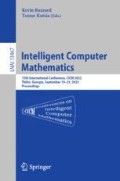Abstract
We introduce Unified Decomposition-Aggregation (UDA) Rules. They are a family of axiom schemata that are instantiated at run-time to add new axioms to a logical theory. These new axioms are implications, whose preconditions will be constructed from an analysis of the goal to be proved and the theory in which it is to be proved. We illustrate their application to query answering using the FRANK system.
Access this chapter
Tax calculation will be finalised at checkout
Purchases are for personal use only
Notes
- 1.
Previously called decomposition rules.
- 2.
See https://en.wikipedia.org/wiki/Association_list (last accessed: 02-02-2022). Alists are not lists but sets, but the ‘alist’ terminology has, unfortunately, become standard.
- 3.
https://en.wikipedia.org/wiki/Epsilon_calculus accessed on 02.02.2022.
- 4.
Although not for any of the examples in this paper.
- 5.
Or similar, depending on the statistical methods used.
- 6.
Note that the temporal rule can also use non-statistical aggregation functions, e.g., temp(max) could be used to find the maximum value of a property among a set of times.
- 7.
https://en.wikipedia.org/wiki/68-95-99.7_rule accessed on 12.5.22.
- 8.
We are grateful to an anonymous reviewer for pointing out this analogy and suggesting that we discuss it here.
References
Bachmair, L., Ganzinger, H.: Resolution theorem proving. In: Robinson, J.A., Voronkov, A. (eds.) Handbook of Automated Reasoning, vol. 1, vol. I, chap. 2, pp. 19–199. Elsevier (2001)
Bundy, A.: A Science of Reasoning, pp. 178–198. MIT Press, Cambridge (1991)
Bundy, A., Byrd, L., Luger, G., Mellish, C., Milne, R., Palmer, M.: Solving mechanics problems using meta-level inference. In: Buchanan, B.G. (ed.) Proceedings of IJCAI-79, pp. 1017–1027. International Joint Conference on Artificial Intelligence (1979)
Bundy, A., Nuamah, K.: Combining deductive and statistical explanations in the FRANK query answering system. In: Gong, Z., Li, X., Oguducu, S.G. (eds.) Proceedings of the 12th IEEE International Conference on Big Knowledge (ICBK), IEEE, Auckland, New Zealand, December 2021
Bundy, A., Nuamah, K., Lucas, C.: Automated reasoning in the age of the internet. In: Fleuriot, J., Wang, D., Calmet, J. (eds.) AISC 2018. LNCS (LNAI), vol. 11110, pp. 3–18. Springer, Cham (2018). https://doi.org/10.1007/978-3-319-99957-9_1
Das, R., et al.: Multi-step entity-centric information retrieval for multi-hop question answering. In: Proceedings of the 2nd Workshop on Machine Reading for Question Answering, pp. 113–118 (2019)
Fierens, D., et al.: Inference and learning in probabilistic logic programs using weighted boolean formulas. Theor. Pract. Logic Program. 15(3), 358–401 (2015)
Fletcher, T., Bundy, A., Nuamah, K.: Statistics automation in a query-answering system. Technical report, The University of Edinburgh (2022)
Nilsson, N.J.: Probabilistic logic. Artif. Intell. 28(1), 71–87 (1986)
Nuamah, K.: Functional inferences over heterogeneous data, unpublished Ph.D. Dissertation, University of Edinburgh (2018)
Nuamah, K.: Deep algorithmic question answering: towards a compositionally hybrid AI for algorithmic reasoning. In: Workshop on Knowledge Representation for Hybrid and Compositional AI (2021)
Nuamah, K., Bundy, A.: Calculating error bars on inferences from web data. In: Arai, K., Kapoor, S., Bhatia, R. (eds.) IntelliSys 2018. AISC, vol. 869, pp. 618–640. Springer, Cham (2019). https://doi.org/10.1007/978-3-030-01057-7_48
Nuamah, K., Bundy, A., Jia, Y.: A context mechanism for an inference-based question answering system. In: AAAI2021 Workshop on CSKGs, vol. 8 (2021)
Acknowledgements
Thanks to Nicholas Ferguson, Thomas Fletcher, Xue Li, Ruqui Zhu and five anonymous reviewers for feedback on an earlier draft. This research has been supported by Huawei grants CIENG4721/LSC and HO2017050001B8s. For the purpose of open access, the author has applied a Creative Commons Attribution (CC BY) licence to any Author Accepted Manuscript version arising from this submission.
Author information
Authors and Affiliations
Corresponding author
Editor information
Editors and Affiliations
Rights and permissions
Copyright information
© 2022 The Author(s), under exclusive license to Springer Nature Switzerland AG
About this paper
Cite this paper
Bundy, A., Nuamah, K. (2022). Unified Decomposition-Aggregation (UDA) Rules: Dynamic, Schematic, Novel Axioms. In: Buzzard, K., Kutsia, T. (eds) Intelligent Computer Mathematics. CICM 2022. Lecture Notes in Computer Science(), vol 13467. Springer, Cham. https://doi.org/10.1007/978-3-031-16681-5_15
Download citation
DOI: https://doi.org/10.1007/978-3-031-16681-5_15
Published:
Publisher Name: Springer, Cham
Print ISBN: 978-3-031-16680-8
Online ISBN: 978-3-031-16681-5
eBook Packages: Computer ScienceComputer Science (R0)

